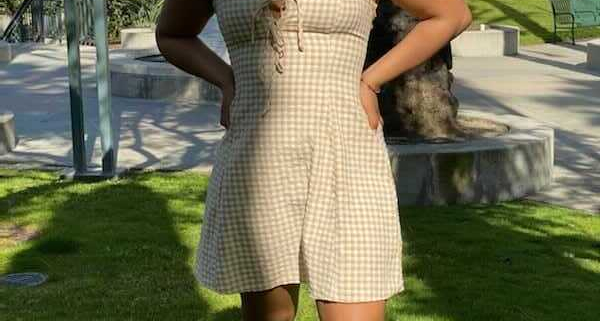BSA leader works toward ‘more equitable campus’

The first time Jaya Hinton visited USC she was amazed by how happy everybody looked. Coming from a snowy east coast, the shining sun and California heat excited her. Growing up in Silver Spring, Maryland, USC had not been on Hinton’s radar until late in high school, but by a stroke of luck she found out she had applied by the merit scholarship deadline when she was notified of her acceptance in January. The very first college she visited, Hinton felt like USC was home.
“People genuinely look happy here, even though they’re doing work,” said Hinton, a junior majoring in business administration. “They’re still outside soaking in the sun, they’re with other people. They’re still laughing and smiling, even though they’re probably also stressed out, and I appreciated that.”
During her freshman year Hinton met some of her best friends and felt welcomed into the USC community while living on Somerville floor, a special interest residential community for Black students. Through football games, tailgates and spending time at the Center for Black Cultural and Student Affairs, Hinton started meeting and getting to know as many people as possible.
“I don’t think I’ll want to change anything about my first-year experience,” Hinton said. “Everything that happened was essential to my growth as a person, essential into coming into who I was as a leader and a student and growing into that role of adult, so I’m very happy with everything that happened my freshman year and all the decisions I made and the ups and the downs and everything.”
Having found a community herself, Hinton said it was important for her to help other Black people on campus find a space where they belonged, which is why she decided to work for CBCSA and be involved with the Black Student Assembly, where she currently serves as the co-executive director. Aside from those roles, Hinton’s campus involvement includes being a student ambassador and core mentor for the applied leadership program at Marshall and working with admissions to recruit a more diverse student body.
“You have to figure out ways to foster engagement and make people feel like they’re part of a community, especially when they’ve never been to campus or never met anyone on campus,” Hinton said. “[BSA has] meetings every week. We’ve been focusing on leaving time for speed friending, so essentially just putting people like two or three people into breakout rooms and giving them the chance to talk to each other and get to know each other.”
Hinton is also working with her team to make BSA inclusive and welcoming of intersectional identities such as students who are Black and LGBTQ+ and consulting members before making leadership decisions and publishing statements as an organization. The improved transparency, Hinton said, has allowed her to feel more confident about her decision making and leadership. Before calling for the resignation of former Undergraduate Student Government President Truman Fritz and Vice President Rose Ritch after claims of racial misconduct and complicity, for instance, BSA conducted a survey and reached out to members to gauge their opinions.
“The only thing we can really do is work within our groups in our organization to make sure that everybody who fits under that umbrella of Black feels welcome, but then also promoting organizations that want more inclusivity and representation,” Hinton said. “So working with USG to make sure that we’re promoting their open positions more, but then also making sure that this year we added two intersectionality chairs to the BSA board to make sure that students who are Black and LGBTQ for example feel like they have a place in BSA, and that they don’t have to pick an identity but that they can feel both and they can belong in BSA.”
Coming in as a pre-med, African American studies major, Hinton decided to switch to business administration two weeks into her first business class freshman year after realizing it would be a better fit for her as someone who is articulate and good at administrative tasks, she said. Along the way, she met mentors like Theo Fowles, then assistant director for CBCSA, who hired her and introduced her to the Black community at USC and Stacy Geck, her professor for Communication Strategy in Business, who helped her realize business was the right choice by working with her outside of class on resumes and helping her apply for internships.

community by living on Somerville floor during freshman year. (Photo courtesy of Jaya Hinton)
“It was interesting because after our semester together, [Hinton] and I still kept in contact,” said Geck, an associate professor of clinical communication. “She would ask me questions about her leadership roles … she wanted to find out how to get folks unified with the differences and how to bring them together. We had great conversations about personality and management, self-management and self-reflection. And she’s one of those individuals even at her young age who is willing to reflectively step back, look, see, alter, modify, change and grow. Those are skill sets that sometimes take [a] lifetime to develop.”
Over time Geck said she has seen Hinton grow both as an individual and a leader. While Hinton had always been a unique classroom presence due to her outspoken, inquisitive nature, Geck said she has witnessed her taking on challenges and developing as a leader.
“I’ve seen her become more comfortable with who she is … and I think it’s important to understand that she steps into roles and responsibilities that are sometimes bigger than she sees them initially to be, and she grows and rises to the occasion,” Geck said. “I’ve seen her develop her approachability and her style. I’ve also seen her develop her level of confidence and comfort in knowing what she knows rather than second guessing herself.”
Hinton has also worked closely with the Black Alumni Association as a BAA scholar and mentee in the Legacy Through Leadership mentoring program. Tensie Taylor, associate director of BAA, said she was impressed with Hinton’s commitment to helping Black students find a community and ability to connect with people on a personal level.
“Even if [Hinton] was across campus, if she saw me she would even wave or even run over and see me or we will run and meet halfway,” Taylor said. “That’s just the type of person that she is and I just treasure her dearly and professionally. It really speaks a lot when someone can be a leader in the public eye but then at the same time their leadership is who they are behind closed doors, because how she is as a leader is how she is with me personally.”
Since the shift to an online semester, Hinton’s biggest challenge has been maintaining a work-life balance with her academic xand leadership roles while being in the same place and managing an academic workload that includes 15 weeks of classes crammed into 12. By joining study groups in class that foster a sense of community and relying on her teammates at BSA, she said she has been able to get by.
“I have an amazing team that I feel very good about delegating to so that’s been really important,” Hinton said. “Not taking on all of the work myself, but working with my co-director, working with our parliamentarian and our outreach chair and our unity chair and making sure that we’re not taking on more than we can handle. Not to say that I’m not extremely overwhelmed because I am, but it could be a lot worse if I didn’t have that team that I trust.”
Calvin Carmichael, co-director of BSA, knew Hinton a few months before they each started at USC. He said Hinton’s flexibility and communication during the online semester to prioritize BSA alongside her classes and returning home amazed him and made working together better.
“She is someone who is really supportive,” said Carmichael, a junior majoring in business of cinematic arts. “One thing I really like about working with Jaya is we make sure to check in with each other a lot. BSA is a very large organization and we support a lot of students, so it takes a lot out of us and that’s one thing we make sure we prioritize. Especially not within just ourselves but our e-board and our members … we put everyone’s well-being first.”
Throughout her time at USC, Hinton said she has grown from someone who would keep her dissenting opinions to herself to get along with everyone to someone who is confident in her ideas but able to remain open-minded. Former BSA co-director Mae Gates, who has known Hinton for three years, has noticed her growth.
“I’ve definitely seen her transform into a phenomenal leader, and just overall a campus leader,” said Gates, a senior majoring in public policy. “When she first came to campus as a freshman she was great, but I think I’ve really seen her kind of grow out of her shell, grow into her confidence and her capabilities as a student, as a student leader … She is also able to help those around her grow into themselves as well.”
Hinton echoed the remarks of Abeer Tijani, another student leader who has spoken out about anti-Blackness at USC, about working to change the University because of how much she loves it. She added that it is important to stand by your beliefs and to continue working to make the University a better, more equitable campus, even when the administration’s actions are disappointing.
“We work so hard to make USC a better place because we love it, not because we hate it,” Hinton said. “I think if we all operate under that mindset, you know we’re trying to improve it not necessarily destroy it then I think everything would be a lot more productive. So I am really happy that everyone is working so hard to advocate and to improve USC for those marginalized people because like I said before, we should be advocating for the little guy.”

